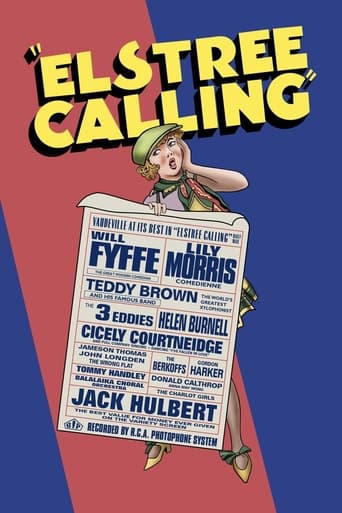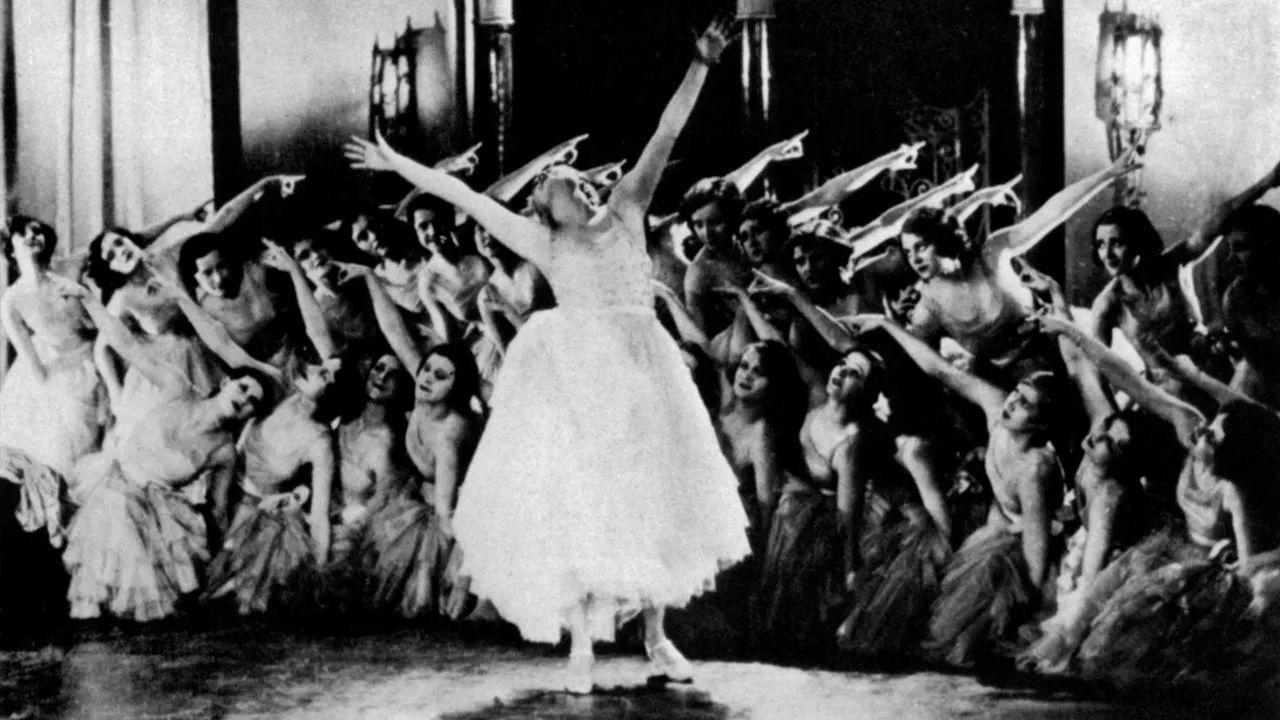rowenalite
Released in 1930, Elstree Calling was directed by Andre Charlot, Jack Hulbert, Paul Murray, and Alfred Hitchcock. Luckily, too many cooks did not spoil the broth in this case but created a marvelous musical and comedic soufflé. The film is a series of vaudeville-type skits and sketches. Tommy Handley hosts the show. "Think, and having thunk, think again," Handley humorously advises the audience. The sections vary in quality but none are poor. Among the best: Teddy Brown whistling while playing the xylophone; lovely, blonde, and ethereal Helen Burnell in a sparkling sequined gown singing; a sprightly Russian-style song and dance number; Cicely Courtnedge singing an entrancing rendition of I'm Falling In Love; and Jack Hulbert and Helen Burnell in a dynamic duet. One brief sketch is darkly humorous as a man appears to enter a home, shoot the man and woman he "catches" kissing, only to realize, "I'm in the wrong flat!" In one section, bagpipes play while a Scotsman in a kilt sings about how "happiness costs such a lot." It is wonderfully sung but some viewers may be offended by the way it plays on the stereotype of the Scots as stingy.Far more viewers are apt to be offended by the sketches done by "The Three Eddies." The tap dancers are in blackface with white lips, white bowler hats, and white-rimmed round eyeglasses. Their tap dancing is wonderfully skilled but one does not have to be a stickler for "political correctness" to be disturbed by the racist stereotyping in their act. A better note is struck in a skit in which Elstree Calling appears to play with racial (not necessarily racist expectations). In an odd take on The Taming of the Shrew, Anna Mae Wong is the clearly Asian daughter of a white man. Beautiful Wong appears as Katherine in a shiny and revealing outfit. Instead of being "tamed," this "shrew" gets her revenge by throwing cream pies in the faces of all the men around her – including Shakespeare himself!Like many works from past time periods, Elstree Calling sometimes strikes an "off" chord with contemporary audiences. Nevertheless, it is a fast-paced and fun series. One hour and twenty-six minutes long, it never drags but is a very entertaining potpourri of performances.
writers_reign
A curio at best. I've always found Hitchcock to be vastly overrated but in this case there's no discernible trace of Hitchcock in the entire length though there are reports that he was responsible for the dire links in which Gordon Harker is attempting to 'tune' in a television set in his home (in 1930 yet)to a live broadcast emanating from Elstree studios in Borehamwood, Hertfordshire, a link in which the punch line - he finally gets a crystal clear image in the last seconds of the show - can be seen being telegraphed from John O' Groats. It's mostly notable for observations such as that Tommy Handley was already a sufficient name in 1930 to actually MC the show and didn't emerge fully-formed in ITMA. There are songs from the likes of Ivor Novello and Vivian Ellis, both clearly having off days, and four numbers are shot in two-colour tint.
loza-1
This is interesting as a period piece. It is also of interest to Hitchcock fans.Rather like the better-known American film King of Jazz, it is a collection of sketches albeit from the British music halls. Alas, this film is not nearly so good.Sadly the music hall acts do not work so well on film. Will Fyffe, composer of "I Belong to Glasgow" in particular dies the death of a dog in a ditch. There is a little Russian folk instruments orchestra who are uncredited. They probably only cost the studio ten pounds for the lot, and they may have been the same musicians who accompanied the great bass singer Fyodor Shalyapin on some of his best known records. To me they are the one act who come across well in this film. (Unlike Will Fyffe, balalaikas and domras will hold their own anywhere.) Sadly we may never know their names.I doubt if the film makers were aware that what they were producing was a time capsule.
rotcev
Is it worth it to buy this movie? To a Hitchcock fanatic like myself (Vic Evans)I would say "Yes!" but to any person other than a movie historian I would say "Forget it!"It is a collection of skits and songs with a bit of comedy in the form of a London stage musical and comedy "Vaudeville" revue. Revues like this one have been done on the London stage from time to time since Vaudeville days. I remember seeing one in London in 1974 called "Carry On London" with Sid James and many other members of the "Carry On" movie comedy crew."Elstree Calling" (1930) is presented in the form of a very early live TV broadcast hosted by Tommy Handley. You also see a family attempting to tune into this program. Every so often between skits, you see how they are making out. They experience great difficulty throughout the show. The picture comes and goes as they attempt to adjust the set. The TV set even blows up and is later repaired. By the end of the presentation, the reception finally is restored and the program ends. The problems with this new medium (television) is one of the running jokes.To the audiences of today it is of little interest. The singing, dancing and comedy is standard for this type of English variety show of the day but terrible by today's standards. For dancing, think of "The Pleasure Garden" as a comparison. Those familiar with Hitchcock's work may remember "Mr. Memory" from "The Thirty-Nine Steps". The music hall in that film is a similar setting. Alfred Hitchcock said to Francois Truffaut about this film - `Not good.'There is little evidence of Hitchcock except perhaps for a short scene about a murder of the "wrong man". You should recognise the Hitchcock touch in it.While I don't think anyone knows for sure, I have read that Alfred Hitchcock may have been responsible for the TV broadcast/TV viewing family framework that links the skits together and a running gag with Donald Calthrop attempting to recite Shakespeare periodically throughout the broadcast.Best wishes,Vic Evans (marmalade_man [NOSPAM] at yahoo.com


 AD
AD



